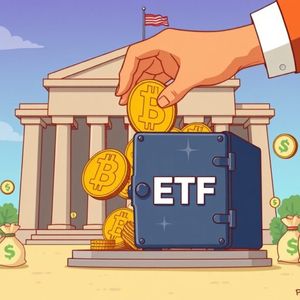Michigan Bitcoin ETF: State Pension Fund’s Strategic Triple Play in Crypto
5 min read
BitcoinWorld Michigan Bitcoin ETF: State Pension Fund’s Strategic Triple Play in Crypto A significant shift is underway in the world of traditional finance, with the Michigan Bitcoin ETF making headlines. Recent SEC filings reveal that Michigan’s state pension fund has dramatically increased its holdings in the Ark Bitcoin ETF. This isn’t just a minor adjustment; it signals a growing confidence in digital assets from established financial institutions and highlights evolving crypto investment trends . Why Michigan’s Bitcoin ETF Play Matters The latest SEC filing, as highlighted by MacroScope on X, shows Michigan’s state pension fund now holds 300,000 shares of the Ark Bitcoin ETF. As of June 30, these shares were valued at a substantial $10.7 million. This figure represents a remarkable threefold increase from the 100,000 shares reported just a few months prior, on March 31. This isn’t just about numbers; it’s about a trend that could reshape investment strategies. What does this dramatic increase signify? Growing Confidence: It shows a clear and increasing trust in Bitcoin as a legitimate investment asset, even from traditionally conservative entities like state pension funds. Diversification Strategy: Pension funds constantly seek ways to diversify portfolios and generate returns. Bitcoin, through ETFs, offers a new avenue. Pioneering Move: While other institutions have dipped their toes, Michigan’s bold move could encourage more state-level entities to consider similar investments. Understanding the Rise of Institutional Crypto Adoption Michigan’s decision is part of a broader narrative of institutional crypto adoption . Over the past few years, we’ve witnessed a gradual but steady integration of digital assets into mainstream finance. Major banks, asset managers, and now public pension funds are exploring how cryptocurrencies fit into their investment frameworks. This growing acceptance underscores a shift in how traditional finance views digital assets. What drives this trend? Regulatory Clarity: The introduction of spot Bitcoin ETFs in the U.S. has provided a regulated and accessible pathway for institutions to gain exposure to Bitcoin without directly holding the cryptocurrency. Performance Potential: Bitcoin’s historical performance and its potential as a hedge against inflation or a growth asset appeal to long-term investors. Demand from Constituents: As digital assets become more prevalent, pension funds may face pressure to explore these opportunities for their beneficiaries. This trend suggests that crypto is moving beyond speculative retail trading and becoming a recognized asset class for serious investors. What Does This Mean for State Pension Fund Bitcoin Strategies? The move by Michigan’s fund raises important questions about how other state pension fund Bitcoin strategies might evolve. Pension funds manage vast sums of money, often with a mandate to ensure long-term stability and growth for retirees. Their investment decisions are typically cautious and thoroughly vetted, emphasizing risk management and long-term viability. Considerations for Pension Funds: Risk Assessment: While Bitcoin offers potential rewards, its volatility remains a key factor. Funds must conduct rigorous risk assessments to mitigate potential downsides. Fiduciary Duty: Fund managers have a fiduciary duty to act in the best interest of their beneficiaries, balancing risk and return to secure future pensions. Public Scrutiny: Investments by public funds are often subject to public and political scrutiny, requiring transparency and clear justifications for their decisions. Michigan’s increased stake could serve as a case study, demonstrating that with careful consideration and through regulated products like ETFs, even conservative funds can embrace digital assets. The Future of Bitcoin ETF Holdings in Public Portfolios The threefold increase in Michigan’s Bitcoin ETF holdings could be a harbinger of things to come. As the digital asset ecosystem matures and more regulated investment vehicles become available, we might see a continued influx of capital from public and private institutions. The accessibility provided by ETFs simplifies the investment process for large entities, removing many operational complexities and making digital assets more palatable for traditional portfolios. Actionable Insights for Investors: Monitor Institutional Moves: Keep an eye on SEC filings and announcements from major funds; they often signal broader market trends and potential shifts in investment paradigms. Understand ETF Mechanics: Learn how Bitcoin ETFs work and their advantages for indirect exposure to the asset without the complexities of direct ownership. Diversify Wisely: While institutional adoption is positive, always conduct your own research and consider your personal risk tolerance before making any investment decisions. This institutional interest validates Bitcoin’s growing role in the global financial landscape, potentially paving the way for even wider adoption and solidifying its place as a legitimate asset class. Michigan’s state pension fund’s decision to dramatically triple its Ark Bitcoin ETF holdings marks a pivotal moment. It underscores the accelerating trend of institutional confidence in digital assets and highlights Bitcoin’s evolving role as a legitimate component of diversified investment portfolios. As more traditional financial giants embrace this new frontier, the landscape of global finance continues to transform, with digital assets firmly taking their place. Frequently Asked Questions (FAQs) What is the Michigan state pension fund’s recent Bitcoin ETF investment? The Michigan state pension fund recently tripled its holdings in the Ark Bitcoin ETF to 300,000 shares, valued at $10.7 million as of June 30, up from 100,000 shares on March 31. Why is the increase in Michigan’s Ark Bitcoin ETF holdings significant? This threefold increase signals growing confidence in Bitcoin as a legitimate investment asset from a traditionally conservative institution, highlighting a broader trend of institutional crypto adoption. What does “institutional crypto adoption” mean? Institutional crypto adoption refers to the increasing integration of cryptocurrencies and digital assets into the portfolios and operations of large financial institutions, such as pension funds, banks, and asset managers. Are Bitcoin ETFs a safe investment for pension funds? While Bitcoin ETFs offer regulated exposure, pension funds must conduct thorough risk assessments due to Bitcoin’s volatility and adhere to their fiduciary duties, balancing potential returns with inherent risks. Will other state pension funds follow Michigan’s lead? Michigan’s increased stake could serve as a case study, potentially encouraging other state pension funds to explore similar Bitcoin ETF holdings as they seek diversification and respond to evolving crypto investment trends. Did you find this insight into institutional crypto adoption compelling? Share this article with your network and join the conversation about the future of finance on social media! To learn more about the latest crypto market trends, explore our article on key developments shaping Bitcoin institutional adoption. This post Michigan Bitcoin ETF: State Pension Fund’s Strategic Triple Play in Crypto first appeared on BitcoinWorld and is written by Editorial Team

Source: Bitcoin World



